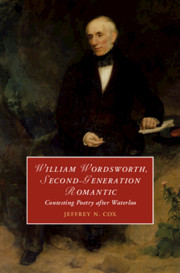Book contents
- William Wordsworth, Second-Generation Romantic
- Cambridge Studies in Romanticism
- William Wordsworth, Second-Generation Romantic
- Copyright page
- Dedication
- Contents
- Figures
- Acknowledgments
- Abbreviations
- Introduction
- Chapter 1 Cockney Excursions
- Chapter 2 Wordsworth’s “Thanksgiving Ode”
- Chapter 3 “This Potter-Don-Juan”
- Chapter 4 Thinking Rivers
- Chapter 5 Late “Late Wordsworth”
- Postscript Wordsworth in 1850
- Notes
- Select Bibliography
- Index
- Cambridge Studies in Romanticism
Chapter 1 - Cockney Excursions
Published online by Cambridge University Press: 10 June 2021
- William Wordsworth, Second-Generation Romantic
- Cambridge Studies in Romanticism
- William Wordsworth, Second-Generation Romantic
- Copyright page
- Dedication
- Contents
- Figures
- Acknowledgments
- Abbreviations
- Introduction
- Chapter 1 Cockney Excursions
- Chapter 2 Wordsworth’s “Thanksgiving Ode”
- Chapter 3 “This Potter-Don-Juan”
- Chapter 4 Thinking Rivers
- Chapter 5 Late “Late Wordsworth”
- Postscript Wordsworth in 1850
- Notes
- Select Bibliography
- Index
- Cambridge Studies in Romanticism
Summary
Wordsworth published his Excursion in 1814 to stake his claim to being the Milton of his day: the poem was seen as the period’s most serious attempt at an epic poem. After briefly taking up Wordsworth’s goals in writing this long narrative poem, this chapter focuses on Hazlitt’s critique of the epic and on the efforts of Keats, Shelley, Byron, Peacock, Reynolds, and Hunt to rewrite it. Recognizing the power of The Excursion, the younger writers found it embracing a turn inward to the self rather than outward to sexual relations and also abandoning the attempt to reform society, whether through revolution or other means. These poets also contested the style of The Excursion, which they saw as abandoning the experimental turn of Wordsworth’s earlier poetry. The very mode of these responses to Wordsworth – the fantastic pagan romances of Endymion and Rhododaphne, the eastern quests of “Alastor” and Laon and Cythna, even the “romaunt” of Childe Harold – announce their distance from The Excursion. A "Coda" to the chapter shows how Wordsworth’s classicizing poems, particularly "Laodamia" and "Dion," can be read as a rebuke to young writers’ revolutionary take on politics and sexuality.
- Type
- Chapter
- Information
- William Wordsworth, Second-Generation RomanticContesting Poetry after Waterloo, pp. 34 - 77Publisher: Cambridge University PressPrint publication year: 2021

